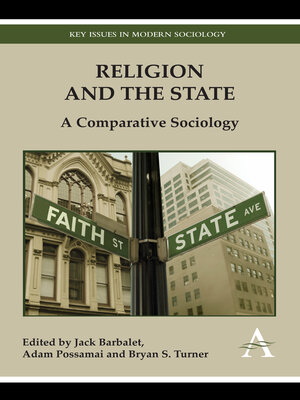Religion and the State
ebook ∣ A Comparative Sociology · Key Issues In Modern Sociology
By Jack Barbalet

Sign up to save your library
With an OverDrive account, you can save your favorite libraries for at-a-glance information about availability. Find out more about OverDrive accounts.
Find this title in Libby, the library reading app by OverDrive.



Search for a digital library with this title
Title found at these libraries:
| Library Name | Distance |
|---|---|
| Loading... |
With a clear statement of the theoretical issues in the debates about secularization and post-secularism, 'Religion and the State: A Comparative Sociology' considers a number of major case studies – from China, Europe, Singapore and South Asia – in order to understand the rise of public religions in the modern state. By distinguishing between political secularization – the separation of state and religion – and social secularization – the transformation of the everyday practice of religion – this volume offers an integrating framework within which to analyze these different societies.
|This volume addresses a central problem of contemporary states, namely how to manage the eruption of public religions. While the liberal framework formerly regarded religion as simply a matter of private practice and conscience, in modern states religion has often come to challenge the so-called Westphalian model of church-state relations, and has brought into question many liberal notions of secularism and tolerance. There is much discussion about post-secular society in which religion has to be taken seriously in public affairs. This collection of case studies – looking at Turkey, Singapore, India, China, Britain, Europe and the United States – explores a number of examples in which the state exercises some degree of management of religion, thereby bringing into question the traditional separation of religion and state. This study also attempts to refine the notion of secularization by examining this process in terms of political arrangements (church-state relations) and the role of religion in everyday life. Ultimately, this study reveals that there is no uniform or standard pattern of secularization in modern societies.







